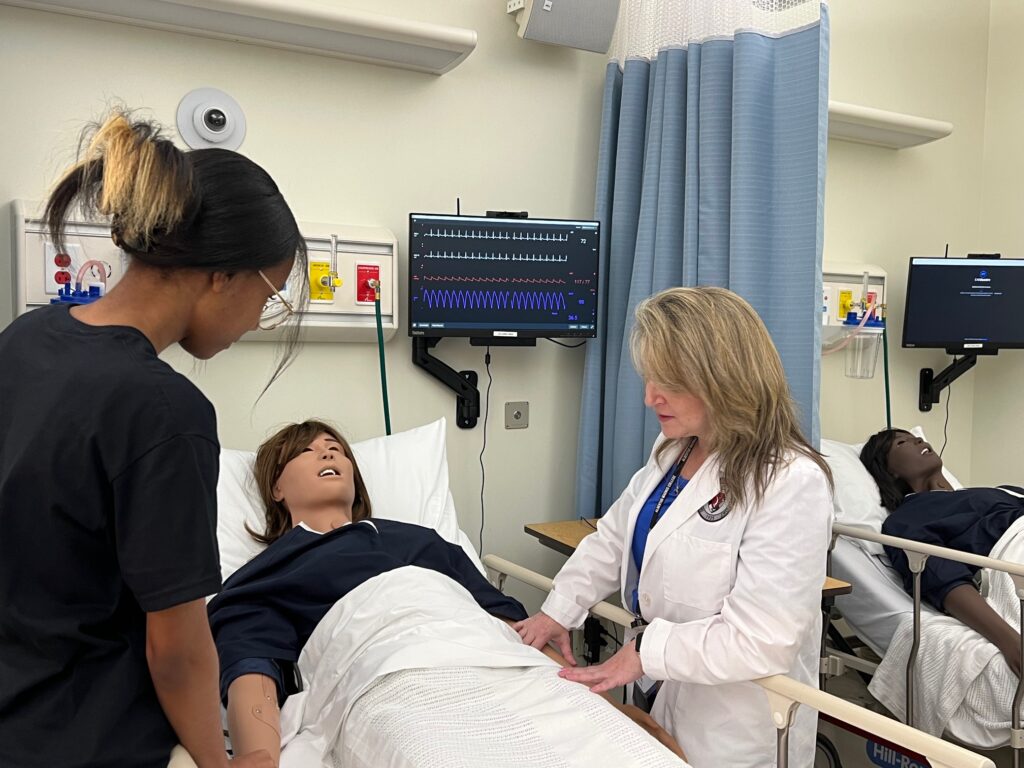By Alix Boyle
To help address a statewide and national nursing shortage, Albertus Magnus College in New Haven launched a Bachelor of Science in Nursing (BSN) degree beginning in the fall of 2024.
“Our program is student-focused and personalized with small class sizes,” says Dr. Cynthia Jeffrey, associate professor and program director. “Albertus is founded in the Dominican tradition with the pillars of prayer, study, community and service. That’s what nursing is all about.”
The first group accepted into the new nursing degree program has only 13 students and represents the diversity of the nursing profession itself. Five students are traditional, coming to Albertus straight out of high school. Some are transfer students. There is one male student, and the rest are female. The age range is from 19 to 48, with some older students having experience as licensed practical nurses.
“We are the most diverse Catholic college in New England and our first cohort reflects that,” Jeffrey says. There are Latinx students, African American, white and Asian. The college has an enrollment of about 1,300 students across the undergraduate, accelerated adult undergraduate and 12 graduate programs.
In addition, Albertus will also offer a Licensed Practical Nurse to Bachelor of Science in Nursing program, the first of its kind in the state. It is accepting applications for the first cohort that will begin in January.
The plan going forward is to accept up to 52 students each year for nursing. Most classes have fewer than 20 students and never more than 26.
As a brand-new program, nursing students will have the opportunity to work with the latest technology. Albertus has purchased a variety of lifelike nursing manikins to give students the experience of treating “patients” in a safe learning environment. In the skills lab, students will learn to take blood pressures and insert Foley catheters on mid-fidelity manikins in a hospital bed with a working headwall, just like in a hospital or other healthcare setting. In the simulation lab, students will work with four very lifelike high-fidelity manikins: male, pediatric, newborn and a birthing mom.
“Studies find that the more lifelike the simulation is, the more the students learn,” Jeffrey states. “It’s a safe environment. We have cameras and film everything. We can play back the experience and let the students look and see what they would do differently next time.”
Each member of the nursing faculty has worked in the profession for at least 20 years. They bring their years of experience to the students. Albertus has formed partnerships with top healthcare organizations in the area to give the students hands-on clinical experience that will prepare them for the workforce. The organizations include Connecticut Hospice, Gaylord Specialty Healthcare, Griffin Health, Mary Wade Home, Sage Healthcare and Yale New Haven Health System.
Jeffrey has worked in many areas of the nursing field, including coronary care, telemetry, hospice and home care. She has taught in associate degree, bachelor’s degree and master’s degree nursing programs, as well as in a licensed practical nurse program. She has worked as a nurse for 25 years and has been teaching for 12 years.
A significant number of registered nurses will retire in the next two years, both in Connecticut and across the U.S., Jeffrey says. Programs to create new nurses are crucial. “We have nowhere near what will be needed to deal with the shortage.”
This summer, high school students interested in nursing attended a two-day camp at Albertus where they received training and a certificate in CPR and first aid. They listened to guest speakers talk about the nursing profession and toured Gaylord Specialty Healthcare. Classes like this help create a nursing pipeline.
Once students are enrolled in college, they can join the Certified Nursing Assistant (CNA) program during intersession (the period between first and second semester).
“We partnered with Gaylord Specialty Healthcare to offer a CNA course for pre-nursing students,” Jeffrey says. “The students are actually talking to patients and giving a little care. It’s a huge advantage. They can get a part-time job as a certified nursing assistant.”
Students take prerequisites freshman year and can apply to the nursing program as long as they have a 3.0 GPA. Generous scholarships are available.
In addition to a personalized nursing education, students are required to take classes in liberal arts where they will gain skills in critical thinking, decision-making ethics and compassionate care.
For Jeffrey, the most rewarding part of leading the new BSN program at Albertus is being able to witness the transformative journey of its students. “I have already had the pleasure of doing this with our pre-nursing students who will be starting their nursing courses this fall. Being able to see them grow from eager, aspiring student nurses into confident, competent professionals who are ready to make a meaningful impact in the healthcare field will be incredibly fulfilling. I am particularly proud of our innovative curriculum, which not only equips students with the necessary clinical skills but also emphasizes holistic patient care, clinical judgment and ethical leadership,” Jeffrey says.
She adds, “Additionally, the opportunity to collaborate with a dedicated team of faculty and staff, all working towards the common goal of student success, is truly inspiring. It’s a privilege to be a part of shaping the future of nursing education at Albertus Magnus College.”







More Stories
From Hall High to the Heart of Saint Francis: Dr. DeSimone Comes Home
Jamie Shawver, D.O.: The Modern-Day Family Doctor
Leading in Urologic Oncology: Ryan Dorin, M.D., Works on Expanding Patient Care